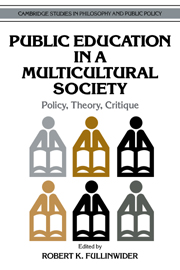Book contents
- Frontmatter
- Contents
- Contributors
- Preface
- PART I INTRODUCTION AND CRITIQUE
- 1 Multicultural education: concepts, policies, and controversies
- 2 Antiracist civic education in the California History–Social Science Framework
- 3 A conflict of visions: multiculturalism and the social studies
- PART II CULTURE AND IDENTITY
- PART III RELATIVISM, REASON, AND PUBLIC EDUCATION
- PART IV TEACHING HISTORY
- PART V TEACHING LITERATURE
- Index
2 - Antiracist civic education in the California History–Social Science Framework
Published online by Cambridge University Press: 05 June 2012
- Frontmatter
- Contents
- Contributors
- Preface
- PART I INTRODUCTION AND CRITIQUE
- 1 Multicultural education: concepts, policies, and controversies
- 2 Antiracist civic education in the California History–Social Science Framework
- 3 A conflict of visions: multiculturalism and the social studies
- PART II CULTURE AND IDENTITY
- PART III RELATIVISM, REASON, AND PUBLIC EDUCATION
- PART IV TEACHING HISTORY
- PART V TEACHING LITERATURE
- Index
Summary
The California History-Social Science Framework is an impressive document in several respects. My interest here is in its articulate and detailed championing of ethically informed and civically responsible education. In its commitment to providing such an education to children from all ethnic and cultural backgrounds, the Framework distances itself (though not explicitly) from those who wish education to be morally neutral. It also avoids the anxious hand-wringing of those who want the schools to teach values but are worried about the basis for teaching some values rather than others. The Framework cuts through this philosophically interesting but pedagogically constraining concern about relativism largely by grounding, or attempting to ground, its conception of ethical education in a framework of “civic education.”
In keeping with the American tradition of “social studies” as, in part, a training in the values and virtues needed for participation in a democratic polity, the Framework offers a plausible general description of those core values and virtues. This description comprises the first quarter of the document; the final three quarters consist of curricular suggestions evidently meant to exemplify the value guidelines set out in the first part.
The Framework, adopted in 1987, was responsive to multiculturalist currents in society and in the world of education of the past two decades. I want to examine the Framework primarily from the vantage point of one component of multicultural education – what I will call “antiracist education.”
- Type
- Chapter
- Information
- Public Education in a Multicultural SocietyPolicy, Theory, Critique, pp. 23 - 48Publisher: Cambridge University PressPrint publication year: 1996
- 3
- Cited by

